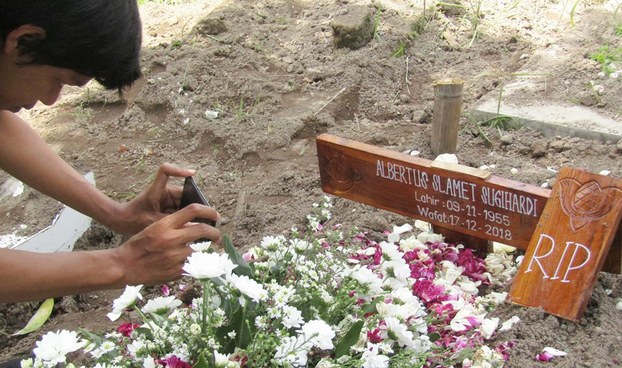A man takes a photograph of a sawn-off Christian cross on the headstone of Albertus Slamet Sugihardi’s grave at a public cemetery in Yogyakarta, Indonesia, Dec. 19, 2018.
Muslim residents were behind the cutting of a wooden cross on a Catholic man’s grave, a community leader in the Indonesian city of Yogyakarta acknowledged Wednesday, in an incident that has drawn accusations of religious intolerance.
Photos of the grave with the cross sawed off at the top have circulated on social media, but locals insisted that the family of the deceased, Albertus Slamet Sugihardi, consented to the decision. BenarNews could not reach the dead man’s relatives to verify this claim.
Bedjo Mulyono, an influential community leader in Purbayan in Yogyakarta’s Kota Gede district, said Albertus’ Muslim neighbors helped wash his body and arranged his funeral on Monday, but they had requested that there should be no Christian symbols if he was to be buried in a local cemetery.
“It is unfortunate that people have been spreading the photos with such misleading information,” Bedjo told BenarNews. “We got along well and did not have a problem, but suddenly we have become notorious and are being accused of intolerance.”
After Albertus’ death was announced, he immediately contacted a nearby church to plan the Catholic man’s funeral service, Bedjo said.
“I worked with other residents to prepare for the funeral, such as digging the grave and bathing the body while Catholic religious leaders were preparing worship,” he said.
Albertus was buried in the local Muslim cemetery, making him the only Christian to be laid to rest there.
“But there are conditions,” Bedjo said, “that there must be no Christian symbols.”
He said the cross was cut when the funeral procession was finished and after the interment.
Residents and Albertus’ family members witnessed the cutting of the cross-shaped headstone, Bedjo said.
Albertus’ widow could not be reached for comment.
Living in harmony
Only three Christian families live in Purbayan village, home to about 700 people, and they have good relations with their Muslim neighbors, Bedjo said.
“There is no discrimination,” he said. “The three families who are of different faith also mix well with other residents.”
Bedjo explained that Albertus also often helped local Muslim women form a choir and coached them, while his wife, Maria, was actively involved in village activities.
“We are very close here. If it was not good, of course we wouldn’t have helped the funeral procession,” he said.
Albertus’ family was also shocked by the controversy, Bedjo said.
However, the incident underscored the weakening of religious tolerance in Yogyakarta, known as the country’s cultural heart, said Halili, a researcher for the Setara Institute, a local human rights group.
“The Purbayan case indicates social and religious inclusion is poor,” Halili, who goes by one name, said in a statement. “The government needs to take action to promote inclusion and education, and create social development programs that are more inclusive and conducive to the promotion of intolerance.”
Sultan Hamengkubuwono X, the governor of Yogyakarta, denied that the incident represented a case of religious intolerance because, he said, the locals and the deceased’s family had agreed about not putting a Christian symbol on the grave.
“Rather than burying the body in Mrican, they agreed to bury him there,” the sultan told reporters, referring to a Christian cemetery about 6.2 miles away (about 10 km).
Indonesia, the world’s largest Muslim-majority country, has seen cases of religious intolerance targeting Christians and other minority religious groups, including Shias and Ahmadis.
Christians often complain that they have difficulty building new churches, and in some cases are prevented from holding services in their churches because locals say they were built without a permit.

